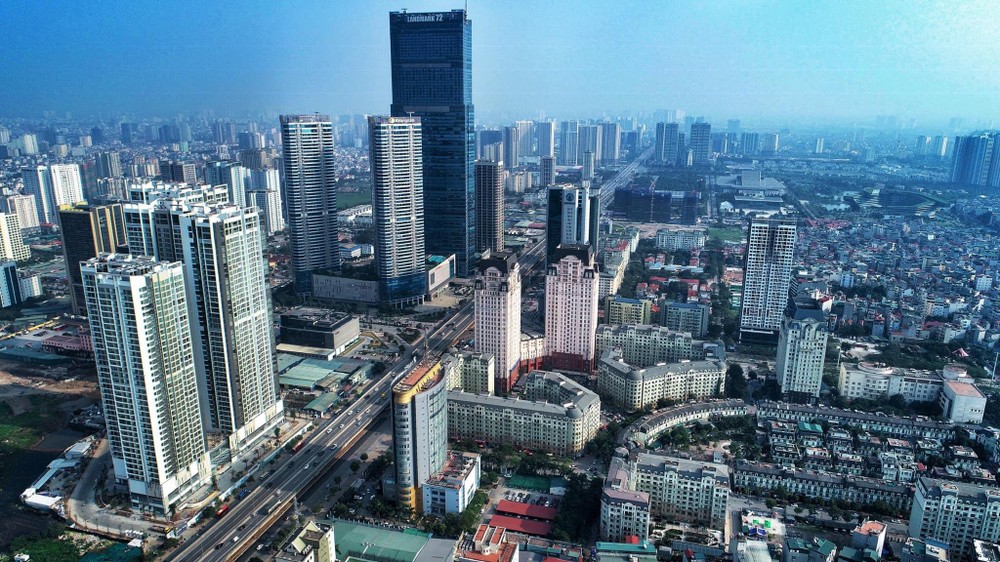
The affirmation reflects continued strong medium-term growth prospects, despite the Covid-19 pandemic and the global economic spillovers from the war in Ukraine, and strong external finance metrics relative to peers. The rating remains constrained by contingent liability risks associated with the large state-owned enterprise (SOE) sector and structural weaknesses in the banking sector.
Strong Medium-Term Growth Prospects: Fitch expects GDP growth to accelerate to 6.1% in 2022 and 6.3% in 2023 from 2.6% in 2021, led by a recovery in domestic demand, strong exports and high FDI inflows, particularly in the manufacturing sector. The economy contracted by 6% yoy in 3Q21 on measures to control a surge in Covid-19 cases. Economic activity resumed in 4Q21 as policy changed to a more flexible approach to the pandemic, made possible by higher vaccination rates; almost the entire adult population of Vietnam is now fully vaccinated.
Risks to our growth outlook remain, including the global economic implications of the war in Ukraine and sanctions on Russia, further pandemic-related shocks and high commodity prices. Fitch’s forecasts for Vietnam's GDP growth factor in our most recent downward revision to global growth to 3.5% in 2022 from 4.2%.
Vulnerable to External Shocks: Vietnam's economic prospects remain susceptible to shifts in external demand due to the economy's high degree of openness. However, Fitch expects the export sector to continue to perform well into the medium term, benefitting from Vietnam's cost competitiveness, trade diversion from China and implementation of key trade agreements.
Export-related FDI inflows have not weakened despite the supply disruptions in 3Q21. Inward investment remained strong in 2021 at USD19.7 billion, down marginally from USD20 billion in 2020. Fitch is factoring in a gradual resumption of tourism inflows from 2022, although pandemic-related disruptions remain a significant risk to our forecasts. Under our baseline, Fitch forecast a reversal to a current account surplus in 2022 and 2023 from a deficit of about 1% of GDP in 2021.
Strong Reserve Buffers: Foreign-exchange reserves continued to improve in 2021, as the State Bank of Vietnam (SBV) intervened in the foreign-exchange market to stabilise the currency. Foreign-exchange reserves rose further to a record of USD109.4 billion by end-2021, supported by large FDI inflows.
Fitch forecasts a gradual appreciation of the exchange rate, in line with Fitch’s expectation of current account surpluses, although Fitch expects the SBV to intervene in the case of excessive currency volatility or if the currency faces significant upward pressure. Vietnam's large external buffers offer a cushion against shocks and support a strong external liquidity ratio, which was 340% at end-2021, above the 175% of the 'BB' median.
New Fiscal Stimulus: A package that was recently approved for disbursement over 2022-2023, equal to about 4% of 2021 GDP, will lead to wider fiscal deficits of 4.8% of GDP in 2022 and 4.2% of GDP in 2023. The package includes measures such as tax cuts and deferrals to support firms, ensure social welfare and job creation, and enhance healthcare capacity.
The fiscal stimulus also includes a capex component worth about 2% of 2022 GDP, which could support medium-term growth prospects, although there are risks over the government's implementation capacity. Vietnam's low revenue base compared with that of its peers remains a weakness in the credit profile.
Government Debt Still Below Peers: The pandemic has had a smaller impact on Vietnam's public finances than the 'BB' median, as early success in containing the pandemic allowed for a restrained fiscal response. Fitch forecasts Vietnam's general government debt-to-GDP ratio will rise to about 42% by 2023 from an estimated 39.7% in 2021, based on the authorities' recently revised GDP data series. This is well below the 'BB' median of 54.5% in 2022 and 55.3% in 2023. Government debt to revenue of 213.5% is lower than the 'BB' median of 239.3%.
Contingent Liability Risks: Fitch thinks contingent liability risks from legacy issues at SOEs and banking-sector weakness remain a drag on the rating. Explicit government guarantees fell to 3.8% of GDP by end-2021 from 4.6% in 2020, but institutional weaknesses continue to weigh on Vietnam's public finances. Fitch believes the banking system remains subject to structural weaknesses, such as thin capitalisation and under-reporting of problem loans. The under-reporting is exacerbated by regulatory forbearance on pandemic-affected restructured loans, which is available until June 2022.
Weaker Structural Indicators: Vietnam's per capita income and human development indicators are weaker than those of peer medians. Fitch estimates per capita income was USD3,685 at end-2021, against the 'BB' median of USD5,261. Vietnam is in the 38th percentile on the UN Human Development Index, compared with the 'BB' median's 50th percentile. In the latest World Bank Governance Rankings, the country's World Bank Governance Indicator ranking is in the 43rd percentile, below the 46th percentile of the peer median.
ESG - Governance: Vietnam has an ESG Relevance Score of '5' for Political Stability and Rights as well as for the Rule of Law, Institutional and Regulatory Quality and Control of Corruption, as is the case for all sovereigns. These scores reflect the high weight that the World Bank Governance Indicators have in our proprietary Sovereign Rating Model. Vietnam has a medium ranking at the 43rd percentile, reflecting a recent peaceful political transition, a moderate level of rights for participation in the political process, moderate institutional capacity, established rule of law and a moderate level of corruption.



















